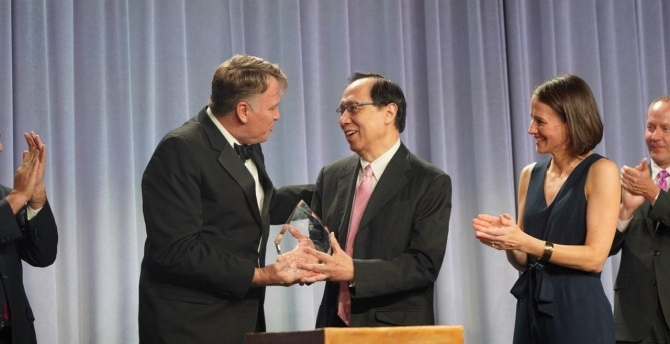
The Foundation for Economic Freedom, an Atlas Network partner in Quezon City, Philippines, has won Atlas Network’s 2019 Templeton Freedom Award for their work to end restrictions on agricultural land patents, liberating billions of dollars in land values and potentially transforming the country’s entire agricultural sector. The award, which carries a cash prize of $100,000, was presented at Atlas Network’s gala Freedom Dinner on November 7.
“In the Philippines the face of poverty is rural," said FEF President Calixto Chikiamco. "Giving farmers the right to do what they would like with their land will be a big step in turning this trend around, and will strengthen our democracy. This award can only inspire us to achieve even greater heights."
For decades, agricultural patent holders in the Philippines were prohibited from selling their land or using it as collateral because of Commonwealth-era legal restrictions that ignored the developing needs of the country’s economy. The Foundation for Economic Freedom’s (FEF) efforts resulted in a new law, passed in February 2019, that removed antiquated legal constraints and opened up a free market for patent holders to use their land as a source of capital. FEF’s research and advocacy was instrumental to helping legislators draft the successful bill, build a coalition of supporters, and network with stakeholders to pass the new law.
“The FEF earned this recognition for years of work toward this recent breakthrough that restored full property rights for 2.5 million people who had been deprived of them in the Philippines," said Brad Lips, CEO of Atlas Network, who presented the award. "FEF has shown that, if you care about economic opportunity for all people, clarifying property rights needs to be a top priority.”
The problems associated with agricultural land patents have deep roots in the country’s transition to independence in the 1930s. Under the Public Land Use Act enacted in 1936, an agricultural free patent was issued to those who have “continuously occupied and cultivated” tracts of agricultural public land. However, patent holders were prohibited from mortgaging or selling their land within 5 years from the issuance of the patent.
In order to circumvent this problem, patent holders engaged in underground market transactions, which increased the risk of default and contributed to the lack of property investment in the countryside, as rural banks were reluctant to lend to farmers with patents because the risk of foreclosure and low marketability of the patent after being foreclosed was a significant barrier. Another problem was that land transactions were not closed for five years, meaning that the original landowners had the option to buy back the property with impunity within that time. As a result, this constricted rural land market became a major cause of agricultural underdevelopment and poverty in the Philippines.
A 2016 study by FEF estimated that agricultural assets covered by the five-year restriction amount to at least ₱387 billion Philippine pesos, or more than $7.5 billion. This amount may even reach trillions of pesos if patents prior to 1980 are included. To fix the problem, FEF helped draft the bill, built a coalition of supporters, and worked with legislators to pass the new law, which is already delivering access to capital for millions of people and transforming the entire agricultural sector of the Philippines.
The new agricultural free patent reform law means that formalized property rights will create opportunities for access to credit and greater land marketability.
“What the Foundation for Economic Freedom has achieved is truly epic,” said Dr. Tom G. Palmer, Atlas Network’s executive vice president of international programs and George M. Yeager Chair for Advancing Liberty. “It took years, but thanks to FEF’s efforts, at one stroke 2.5 million people received full property rights to their land—and that means increased investment, increased output, more opportunities, more freedom, and better lives for all the people of the Philippines.”
About the Foundation for Economic Freedom:
The Foundation for Economic Freedom is a public advocacy organization dedicated to advancing the cause of economic and political liberty, good governance, secure and well-defined property rights, market-oriented reforms and consumer protection. It counts among its members former and present Cabinet secretaries and undersecretaries, leading academic figures, respected media personalities and opinion makers, and prominent members in the business and finance communities.
About Atlas Network’s 2019 Templeton Freedom Award:
Awarded annually since 2004, Atlas Network’s Templeton Freedom Award is named for the late investor and philanthropist Sir John Templeton. This prestigious prize honors Sir John’s legacy by recognizing Atlas Network’s partner organizations for exceptional and innovative contributions to the understanding of free enterprise and the advancement of public policies that encourage prosperity, innovation, and human fulfillment. The Templeton Freedom Award is generously supported by Templeton Religion Trust and was presented during Atlas Network’s Freedom Dinner on Nov. 7 at the Intrepid Sea, Air & Space Museum in New York City. The winning organization will receive a $100,000 prize, and five additional finalists will receive $20,000 prizes.
The other finalists for Atlas Network’s 2019 Templeton Freedom Award were:
- Centre For Development and Enterprises Great Lakes, based in Bujumbura, Burundi; for their “Birashoboka” project.
- Lebanese Institute for Market Studies, based in Amsheet, Lebanon; for their work to liberalize the electricity market in Lebanon.
- Pacific Legal Foundation, based in Sacramento, California, United States; for their litigation work to roll back unconstitutional regulation.
- Platte Institute, based in Omaha, Nebraska, United States; for their occupational licensing reform initiative.
- Reason Foundation, based in Los Angeles, California, United States; for their work to advance public pension reform.
For media inquiries about the 2019 Templeton Freedom Award, contact Melissa Mann at melissa.mann@atlasnetwork.org or (202) 449-8441.
About Atlas Network:
Atlas Network increases opportunity and prosperity by strengthening a global network of independent civil society organizations that promote individual freedom and remove barriers to human flourishing.